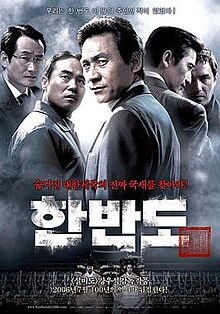| Revision as of 16:57, 11 June 2007 editIcactus (talk | contribs)860 editsm improper connection with category.← Previous edit | Revision as of 06:58, 14 July 2007 edit undoThijs!bot (talk | contribs)470,128 editsm robot Adding: ja:韓半島 (映画)Next edit → | ||
| Line 38: | Line 38: | ||
| ] | ] | ||
| ] | |||
Revision as of 06:58, 14 July 2007
| This article may require cleanup to meet Misplaced Pages's quality standards. No cleanup reason has been specified. Please help improve this article if you can. (October 2006) (Learn how and when to remove this message) |
| Hanbando | |
|---|---|
 Hanbando movie poster Hanbando movie poster | |
| Directed by | Kang Woo-suk |
| Written by | Kim Hie-jae Lee Hyo-cheol |
| Starring | Ahn Sung-ki Cha In-pyo Jo Jae-hyeon Mun Seong-kun Kang Shin-il |
| Release dates | July 13, 2006 (South Korea) |
| Running time | 147 min. |
| Language | Korean |
Hanbando (한반도) is a 2006 South Korean blockbuster film.
Plot
Taking place in the not too distant future, North and South Korean governments are on the verge of re-opening the Kyungui Railroad, which connects the two Koreas as a further step toward reunification, when Japan refuses to accept the decision, claiming rights to the railway lines based on official documents imprinted with the royal seal of King Gojong of Joseon a century ago. Yet an age old conspiracy is uncovered where the royal seal with which King Gojong signed the documents is suspected to be fake. It is a race against time and hidden agendas as the South Korean President (Ahn Sung-ki) employs the outspoken historian Choi Min-jae (Jo Jae-hyeon) and the descendant of the Joseon royal bloodline Kim Yu-shik (Kang Shin-il) to find the authentic seal and prevent the history of Japanese occupation from repeating itself. In the meanwhile, Japanese economic sanctions divide the Korean government, and its armed forces appear on the border of Korea threatening its sovereignty.
Criticism
The film has been criticised as being unrepresentative of current Japan-South Korean relations and for its strong anti-Japanese sentiment.
External links
This Korean film-related article is a stub. You can help Misplaced Pages by expanding it. |